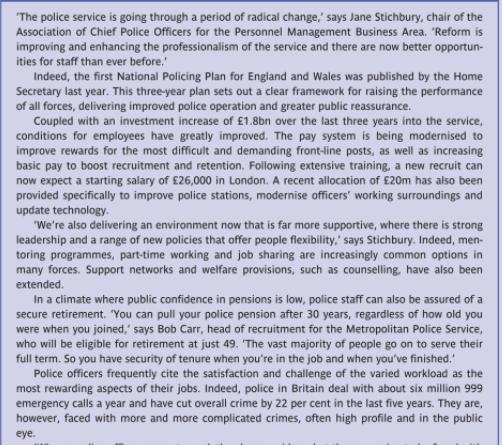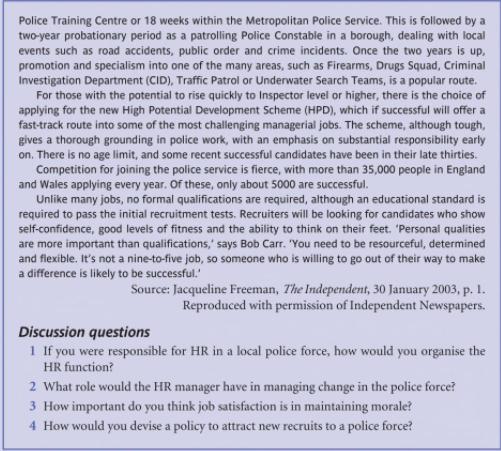Answered step by step
Verified Expert Solution
Question
1 Approved Answer
The police service is going through a period of radical change, says Jane Stichbury, chair of the Association of Chief Police Officers for the



"The police service is going through a period of radical change," says Jane Stichbury, chair of the Association of Chief Police Officers for the Personnel Management Business Area. "Reform is improving and enhancing the professionalism of the service and there are now better opportun- ities for staff than ever before. Indeed, the first National Policing Plan for Engiand and Wales was published by the Home Secretary last year. This three-year plan sets out a clear framework for raising the performance of all forces, delivering improved police operation and greater public reassurance. Coupled with an investment increase of 1.8bn over the last three years into the service, conditions for employees have greatly improved. The pay system is being modernised to improve rewards for the most difficult and demanding front-line posts, as well as increasing basic pay to boost recruitment and retention. Following extensive training, a new recruit can now expect a starting salary of 26,000 in London. A recent allocation of 20m has also been provided specifically to improve police stations, modernise officers' working surroundings and update technology. "We're also delivering an environment now that is far more supportive, where there is strong leadership and a range of new policies that offer people fiexibility,' says Stichbury. Indeed, men- toring programmes, part-time working and job sharing are increasingly common options in many forces. Support networks and weifare provisions, such as counselling, have also been extended. In a climate where public confidence in pensions is low, police staff can also be assured of a secure retirement. "You can pull your police pension after 30 years, regardless of how old you were when you joined,' says Bob Carr, head of recruitment for the Metropolitan Police Service, who will be eligible for retirement at just 49. The vast majority of people go on to serve their full term. So you have security of tenure when you're in the job and when you've finished. Police officers frequently cite the satisfaction and challenge of the varied workload as the most rewarding aspects of their jobs. Indeed, police in Britain deal with about six million 999 emergency calls a year and have cut overall crime by 22 per cent in the last five years. They are, however, faced with more and more complicated crimes, often high profile and in the public eye. "When a police officer comes to work they have no idea what they are going to be faced with over the next eight hours,' says Jan Berry, chair of the Police Federation of England and Wales and a serving police officer with 28 years' experience. 'It can be tough as you are dealing with life and death situations, but this is part of the attraction, the challenge of being able to turn your hand and deal with a small child who is lost one second to a raging fire or shootout the next. There are now a record number of police officers employed by the 43 forces across England and Wales, with 5400 more officers than two years ago. However, the good news is that recruit- ment is still highly active. Indeed, numbers are set to increase, with a government target of 132,500 police officers by 2004. In addition, a further 4000 Community Support Officers are being recruited by forces who have limited powers to deal with low-level crime and disorder. Measures are also being introduced to increase the numbers and effectiveness of Special Con- stables. When joining the police service, whether as a school leaver, a graduate or later in life as a second career, the same basic training programme will apply, lasting for 15 weeks at a National Police Training Centre or 18 weeks within the Metropolitan Police Service. This is followed by a two-year probationary period as a patroling Police Constable in a borough, dealing with local events such as road accidents, public order and crime incidents. Once the two years is up, promotion and specialism into one of the many areas, such as Firearms, Drugs Squad, Criminal Investigation Department (CID), Traffic Patrol or Underwater Search Teams, is a popular route. For those with the potential to rise quickly to Inspector level or higher, there is the choice of applying for the new High Potential Development Scheme (HPD), which if successful will offer a fast-track route into some of the most challenging managerial jobs. The scheme, although tough, gives a thorough grounding in police work, with an emphasis on substantial responsibility early on. There is no age limit, and some recent successful candidates have been in their late thirties. Competition for joining the police service is fierce, with more than 35,000 people in England and Wales applying every year. Of these, only about 5000 are successful. Unlike many jobs, no formal qualifications are required, although an educational standard is required to pass the initial recruitment tests. Recruiters will be looking for candidates who show self-confidence, good levels of fitness and the ability to think on their feet. 'Personal qualities are more important than qualifications,' says Bob Carr. 'You need to be resourceful, determined and flexible. It's not a nine-to-five job, so someone who is willing to go out of their way to make a difference is likely to be successful. Source: Jacqueline Freeman, The Independent, 30 January 2003, p. 1. Reproduced with permission of Independent Newspapers. Discussion questions 1 If you were responsible for HR in a local police force, how would you organise the HR function? 2 What role would the HR manager have in managing change in the police force? 3 How important do you think job satisfaction is in maintaining morale? 4 How would you devise a policy to attract new recruits to a police force?
Step by Step Solution
There are 3 Steps involved in it
Step: 1
and Phan for englond In Rbcing Secretary Rast year Awer The fixst Noctional devel Cuime in Londun th...
Get Instant Access to Expert-Tailored Solutions
See step-by-step solutions with expert insights and AI powered tools for academic success
Step: 2

Step: 3

Document Format ( 2 attachments)
635dd22b3fca5_179146.pdf
180 KBs PDF File
635dd22b3fca5_179146.docx
120 KBs Word File
Ace Your Homework with AI
Get the answers you need in no time with our AI-driven, step-by-step assistance
Get Started


